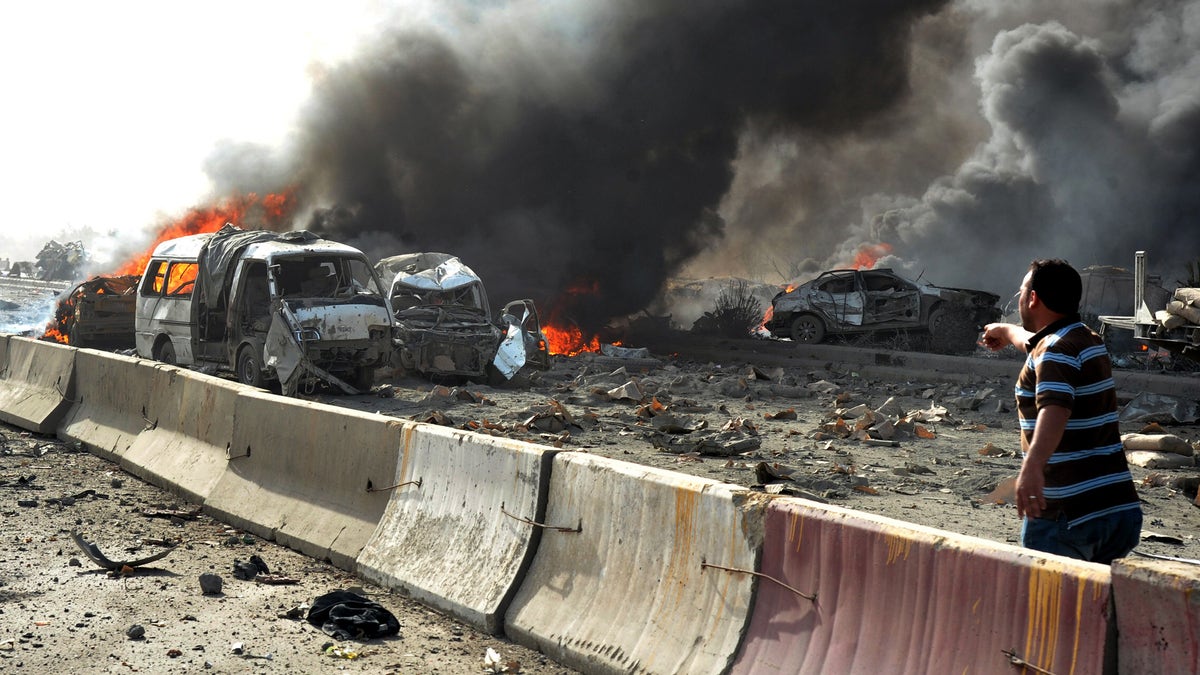
The terrorists behind attacks in Syria like this bombing in Damascus could bring their violence to western shores, says one lawmaker. (AP2012)
TOKYO – The head of Syria's main opposition group said Friday the twin suicide car bombings that killed 55 people in Damascus appeared to be the work of Al Qaeda forces he said were linked to the regime of President Bashar Assad.
Paris-based Burhan Ghalioun, chief of the opposition Syrian National Council, also said the cease-fire brokered by U.N. envoy Kofi Annan was "in crisis" because it lacks teeth.
Speaking at a news conference in Tokyo, Ghalioun said there would be "no peaceful solution" to the violence in Syria without "a threat of force against those who don't implement the plan."
"Assad feels that he can run away from implementing all of his obligations without any consequences," he said.
In Damascus, workers were paving over two massive craters caused by the bombs that struck a Syrian military compound Thursday. The attack, which also wounded more than 370 people, was the deadliest against a regime target since the Syrian uprising began 14 months ago.
Security forces armed with Kalashnikov rifles were guarding the compound Friday.
The bombings fueled fears of a rising Islamic militant element among the forces seeking to oust Assad and dealt a further blow to international efforts to end the bloodshed. Assad's government blamed the blasts on armed terrorists it says are driving the uprising.
But Ghalioun said he didn't think "these radical forces ... are isolated from the regime."
"The relationship between the Syrian regime and Al Qaeda is very strong," he said, adding that the Syrian government had cooperated with Al Qaeda against U.S. forces in Iraq, as well as in its movements in Lebanon.
The United States condemned the bombings and expressed concern that Al Qaeda may be increasingly taking advantage of Syria's prolonged instability. Defense Secretary Leon Panetta told reporters that U.S. intelligence indicates "an Al Qaeda presence in Syria," but said the extent of its activity was unclear.
Ghalioun is visiting Tokyo at the government's invitation and is appealing for diplomatic support and more humanitarian aid. Japan has already provided $3 million in aid, and Foreign Minister Koichiro Gemba said Thursday during his meeting with Ghalioun that Tokyo was considering adding to that.
Ghalioun told reporters Friday that Assad's government had recently been resorting to terrorist tactics to keep people from going out on the streets to demonstrate.
"The Annan plan is in crisis today," he said.
He said the plan would die if Assad's government continues to challenge it and "continues using terrorist bombings."
"We believe that now we cannot reach any compromise through negotiations if Bashar Assad is still in power because he will try to abort any initiative that is based on a political solution," Ghalioun said.
If the Annan plan fails, "the only choice for us will be armed conflict," he said.
